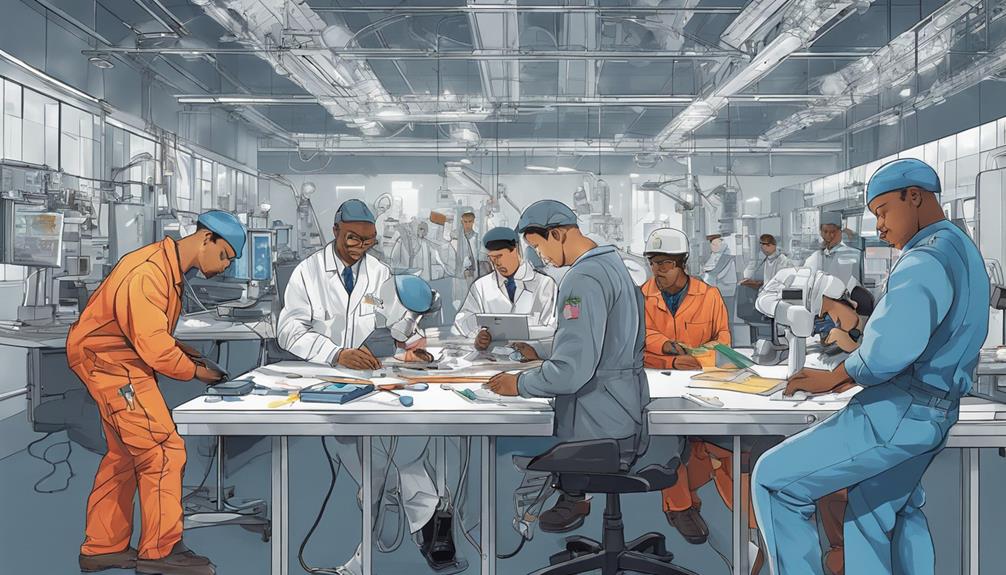As technology progresses, the pressing issue of the effect of AI on jobs becomes ever more relevant.
The notion of job displacement raises concerns for many, yet there are sectors where AI's reach falters, leaving room for human expertise to shine.
In the realm of secure jobs that AI struggles to replace, a strategic approach is essential. But what are the key strategies and insights that can safeguard your career against automation's encroachment?
This article navigates the landscape of AI-resistant job roles, providing a roadmap for professionals seeking to future-proof their careers in an age of digital transformation.
Key Takeaways
- Healthcare professions like RNs, NPs, PAs, and OTs offer job security and growth due to their human-centric nature.
- Creative roles in art, writing, design, and filmmaking thrive on originality and innovation, making them AI-resistant.
- Counseling and therapy jobs rely on empathy and trust, providing personalized mental health support that AI can't replicate.
- Skilled trades such as electrical work, plumbing, and carpentry require hands-on expertise, ensuring job stability and demand.
In-Demand Healthcare Professions
With a projected increase in demand as reported by the Bureau of Labor Statistics, healthcare professions such as Registered Nurses (RNs), Nurse Practitioners (NPs), Physician Assistants (PAs), Medical and Health Services Managers, and Occupational Therapists (OTs) are poised for significant growth and offer lucrative career opportunities in the healthcare sector.
Registered Nurses (RNs) play a critical role in patient care, with a projected job growth of 7% from 2019 to 2029. Nurse Practitioners (NPs) are highly sought after, commanding a median annual wage of $111,680 as of May 2020. Physician Assistants (PAs) are indispensable in healthcare, with a remarkable projected job growth of 31% from 2019 to 2029, surpassing the average for all occupations.
Medical and Health Services Managers oversee healthcare facilities efficiently, with a median annual wage of $104,280, showcasing the rewarding career opportunities in healthcare management. Occupational Therapists (OTs) aid in rehabilitation, with a projected job growth of 16% from 2019 to 2029, demonstrating the increasing demand for their services in the healthcare sector.
Creative Roles Resistant to AI

Demonstrating resilience against advancements in artificial intelligence, creative roles encompassing artists, writers, designers, and filmmakers exhibit a distinct capacity for innovation and originality that sets them apart in the professional landscape. These creative professionals bring valuable creativity to diverse industries, contributing through their human touch and artistic creativity. Here are three key reasons why these roles remain resistant to AI:
- Original Ideas: Creative professionals are adept at generating original ideas that stem from human experiences, emotions, and perceptions, making their work unique and compelling.
- Innovative Work: The nature of artistic creativity, design uniqueness, and filmmaking ingenuity requires a level of inventiveness and experimentation that AI currently struggles to replicate effectively.
- Irreplaceable by AI: The intricate blend of skills, intuition, and personal expression that artists, writers, designers, and filmmakers bring to their respective fields makes their contributions irreplaceable by artificial intelligence, highlighting the enduring importance of human creativity in these professions.
Essential Counseling and Therapy Jobs
Counseling and therapy professions demand a profound reliance on human empathy and trust, qualities that elude replication by artificial intelligence. The essence of these roles lies in the ability to navigate nuanced interactions, offering emotional support, and fostering human connections.
Counselors and therapists provide individualized attention to individuals seeking assistance with their mental health and well-being. AI lacks the capacity to truly understand and empathize with human emotions, making these roles indispensable in today's society.
The median salary for professionals in this field is around $48,000, with advanced education such as a master's degree and certifications typically required. As individuals increasingly prioritize mental health, the demand for skilled counselors and therapists continues to grow.
Their unique ability to establish trust, provide empathy, and engage in personalized care highlights the irreplaceable nature of these essential roles in supporting individuals' mental and emotional well-being.
Skilled Trades Unaffected by Automation

Skilled trades, characterized by their hands-on nature and specialized knowledge, remain largely immune to automation due to the complexity and adaptability of the tasks involved. These professions require a unique set of skills that are difficult to replicate through artificial intelligence or robotics.
- Specialized Knowledge: Skilled trades demand in-depth knowledge and expertise in specific areas such as electrical systems, plumbing, or carpentry, making them less susceptible to automation.
- Practical Training: Hands-on experience gained through apprenticeships and on-the-job training is crucial in mastering skilled trades, emphasizing the practical aspect of these professions.
- Stable Career Opportunities: The demand for specialized services provided by skilled tradespeople ensures a stable job market with opportunities for growth and job security, offering median salaries around $50,000 reflecting the value of their expertise.
Strategic HR and Management Careers
Playing a pivotal role in organizational development and workforce optimization, strategic HR and management careers require a blend of conflict resolution, decision-making, and strategic planning skills to drive business success.
HR professionals are instrumental in shaping organizational culture and fostering employee engagement, crucial for overall productivity and retention. Management careers entail overseeing teams, setting goals, and ensuring organizational success through effective leadership strategies.
HR managers focus on recruiting top talent, designing training programs, and managing employee relations to enhance workforce performance. Professionals in these roles must possess strong skills in conflict resolution to address internal disputes, effective decision-making to drive strategic initiatives, and forward-thinking strategic planning to navigate challenges and opportunities.
These careers often offer competitive salaries, with HR managers averaging around $65,000 and top executives commanding lucrative incomes in the seven-figure range, reflecting the value and impact of skilled professionals in managing human capital and organizational success.
Frequently Asked Questions
Which Jobs Are Secure From Ai?
Professions that involve high levels of human interaction, creativity, specialized manual skills, complex problem-solving, and leadership qualities are more secure from AI automation. These roles rely on emotional intelligence, originality, hands-on expertise, critical thinking, and strategic decision-making.
Which Jobs AI Can T Replace?
Some roles resistant to AI replacement include those requiring high levels of creativity, hands-on care like physical therapy, leadership positions demanding interpersonal skills, skilled trades that are hands-on, and research scientists with complex problem-solving abilities.
Is Artificial Intelligence a Threat to Job Security?
Artificial intelligence poses a significant threat to job security, with up to 30% of jobs at risk of automation by the early 2030s. Industries like manufacturing and retail are particularly vulnerable, emphasizing the need for ongoing adaptation to AI advancements.
Will AI Replace Cyber Security Jobs?
AI's potential to replace cyber security jobs is limited by the intricate and dynamic nature of cyber threats. Human expertise in recognizing and countering sophisticated attacks remains essential. AI can augment security tasks, but skilled professionals will still be indispensable.
Conclusion
In conclusion, the advent of artificial intelligence has led to job displacement in various industries, highlighting the need for individuals to pursue careers that are resistant to automation.
One interesting statistic to consider is that a recent study found that 47% of jobs in the United States are at risk of being automated in the next 20 years.
As technological advancements continue, it is crucial for individuals to focus on developing skills and expertise in fields that prioritize human-centric attributes to secure stable employment opportunities.









